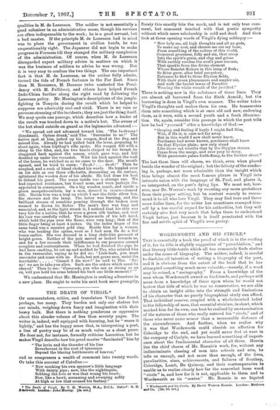THE DEATH OF VIRGIL.* OF commentators, critics, and translators Virgil
has found, perhaps, too many. They burden not only our shelves but our minds, weighing down fancy and imagination with their heavy bulk. But there is nothing ponderous or oppressive
about this slender volume of less than seventy pages. The writer is, indeed, well equipped with learning, but he " wears it lightly," and has the happy sense that, in interpreting a poet, a line of poetry may be of as much value as a sheet prose.
He does'not, for instance, formally criticise Lucretius, but he makes Virgil describe how his great master "fascinated" him by
"The levin and the thunder of his line Reverberant in the rout of ignorance Beyond the blazing battlements of heaven," and so compresses a wealth of comment into twenty words.
Or take this account of Catullus :—
" Now mocking his own sparrow's little language With dainty pipe ; now, like the nightingale, Sobbing the love or woe that wrung his heart ; Now, like a hawk, screaming and swooping nobly At high or low that crossed his fantasy" • The Death of Virgil. By T. H. Warren, 31.A., D.C.L. (MOTO • B. H.
Ble.ekvreD. Lom: John Murray. net.]
Surely this exactly hits the mark, and is not only true com- ment, but comment touched with that poetic sympathy without which mere scholarship is cold and dead. And then look at these opening words of Virgil's dying soliloquy :—
" Now help me, all high thoughts and all ye gods, To make my soul, and cleanse me ere my hour, From something of the soilure of this world, Corporeal grossness, folly and sin, that creep Into the spirit's grain, and clog and grime With earthly residue the soul's pure essence, That sparkle from the divine element
Whose flamelet flickers in this lamp of flesh; So fitter grow, after brief purgatory,
Entrance to find to those Elysian fields, With their green pleasaunces and ampler air, And walk the lucent lawns of Paradise Wearing the white wreath of the justified."
There is nothing new in the substance of these lines. They are almost all borrowed from the Sixth Aeneid ; but the borrowing is done in Virgil's own manner. The writer takes Virgil's thoughts and makes them his own. He transmutes them into something which is at once old and new, endowing them, as it were, with a second youth and a fresh illumina-
tion. Or, again, consider this passage in which the poet tells how he had " yearned " after a knowledge of God :— "Groping and feeling if haply I might find Him, Who, if He is, is sure not far away.
But in this world I now shall never know, Perchance had never known, perchance shall know On that Elysian plain; now only stand Like those sad wraiths that by the Stygian stream Crane from the marge, and ever pray to ferry,
With passionate palms forth-flung, to the further shore."
The last three lines will charm, wo think, even when placed beside the wonder of the original ; but the felicity of the render- ing is, perhaps, not more admirable than the insight which thus brings almost the most famous phrase in Virgil into intimate union with the language of St. Paul, and places it,
so interpreted, on the poet's dying lips. We must not, how- ever, mar Dr. Warren's work by wresting any more quotations from their proper setting, but be content warmly to recom- mend it to all who love Virgil. They may find hero and there some duller lines, for the writer has sometimes cramped him- self by a too careful regard for his authorities, but they will certainly also find very much that helps them to understand Virgil better, just because it is itself penetrated with the fine and subtle spirit of Virgil's own poetry.










































































 Previous page
Previous page